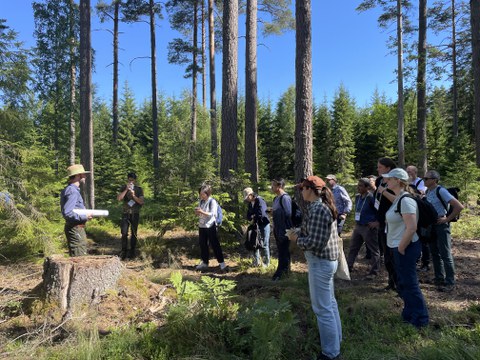Jul 05, 2024
The Chair of Forest Protection at the IUFRO World Congress 2024
The 26th World Congress of the International Union of Forest Research Organizations (IUFRO), which took place in Stockholm from 23 to 29 June 2024, brought together more than 4,000 participants from 102 countries. It provided both a global forum for the exchange of knowledge, perspectives and visions between scientists from a wide range of disciplines as well as for a dialogue between science and forest policy-making levels, forest management, business and other civil organizations. The total of 5,014 talks and posters presented a wide range of topics such as biodiversity and bioeconomy, the resilience of forests and their protection, sustainable management practices and the latest technological approaches for future forests.
The Chair of Forest Protection participated with presentations on forest fire research and the impact of ungulates on forests. Having contributed to the IUFRO Division Forest Health - Unit Ecology and Management of Bark and Wood Boring Insects for many years, the Chair of Forest Protection has now also been invited to participate in the Division Silviculture - Unit Silviculture and Ungulates as well as in the Division Forest Environment - Unit Forest Fires.
The field trips during the World Congress provided further opportunities for visualization and scientifically sound discussions on forest-related topics. The excursion we attended dealt with the driving factors behind browsing pressure, with measures to mitigate browsing and with the question of how ruminant ungulates (in this case elk, red deer, fallow deer and roe deer) and forests in boreal regions can be jointly managed with regard to climate change conditions and the almost exclusively practiced clear-cutting systems. At the Öster Malma estate in the province of Södermanland, the headquarters of the Swedish Association for Hunting and Wildlife Management, insights were given into the game park and the cultural and historical development of the importance of hunting and hunting education, as well as the political and forest management orientations of Sweden. It was shown that game browsing is one of the main causes of direct damage in Swedish commercial forests. The cultivation of tree species that are less attractive to browsing on unsuitable sites, on the other hand, can lead to growth losses and increased susceptibility to other damaging factors. Sometimes, however, medium browsing pressure can also increase biodiversity through disturbance and greater biotope heterogeneity.



